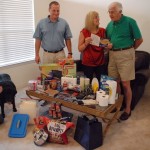Be Hurricane Ready This Spring
 Thursday, April 21, 2011 at 11:15AM
Thursday, April 21, 2011 at 11:15AM  Hurricanes in Georgia? Yes! According to the National Oceanic and Atmospheric Administration (NOAA) Georgia is at particular risk of being affected by hurricanes because it is a coastal state. The hurricanes that affect Georgia are severe tropical storms that form in the southern Atlantic Ocean, Caribbean Sea and Gulf of Mexico. Hurricane season lasts from June 1st until November 30th, but the majority of activity is from August until October. Therefore, every state resident and business owner should plan what to do in the event of a hurricane or tropical storm. The following tips can help you keep you and your family safe this hurricane season.
Hurricanes in Georgia? Yes! According to the National Oceanic and Atmospheric Administration (NOAA) Georgia is at particular risk of being affected by hurricanes because it is a coastal state. The hurricanes that affect Georgia are severe tropical storms that form in the southern Atlantic Ocean, Caribbean Sea and Gulf of Mexico. Hurricane season lasts from June 1st until November 30th, but the majority of activity is from August until October. Therefore, every state resident and business owner should plan what to do in the event of a hurricane or tropical storm. The following tips can help you keep you and your family safe this hurricane season.
Preparing for a Hurricane
If you are under a hurricane watch or warning, here are some basic steps to take to prepare for the storm:
· Learn about your community's emergency plans, warning signals, evacuation routes, and locations of emergency shelters.
· Identify potential home hazards and know how to secure or protect them before the hurricane strikes. Be prepared to turn off electrical power when there is standing water, fallen power lines, or before you evacuate. Turn off gas and water supplies before you evacuate. Secure structurally unstable building materials.
· Buy a fire extinguisher and make sure your family knows where to find it and how to use it.
· Locate and secure your important papers, such as insurance policies, wills, licenses, stocks, etc.
· Post emergency phone numbers at every phone.
· Inform local authorities about any special needs, i.e., elderly or bedridden people, or anyone with a disability.
· Make plans to ensure your pets' safety http://www.bt.cdc.gov/disasters/petprotect.asp
Emergency Supplies You Will Need
You should stock your home with supplies that may be needed during the emergency period. At a minimum, these supplies should include:
· Several clean containers for water, large enough for a 3-5 day supply of water (about five gallons for each person).
· A 3-5 day supply of non-perishable food.
· A first aid kit and manual.
· A battery-powered radio, flashlights, and extra batteries.
· Sleeping bags or extra blankets.
· Water-purifying supplies, such as chlorine or iodine tablets or unscented, ordinary household chlorine bleach.
· Prescription medicines and special medical needs.
· Baby food and/or prepared formula, diapers, and other baby supplies.
· Disposable cleaning cloths, such as "baby wipes" for the whole family to use in case bathing facilities are not available.
· Personal hygiene supplies, such as soap, toothpaste, sanitary napkins, etc.
· An emergency kit for your car with food, flares, booster cables, maps, tools, a first aid kit, fire extinguisher, sleeping bags, etc.
 Champion Construction Systems,
Champion Construction Systems,  Georgia,
Georgia,  Uncategorized,
Uncategorized,  Water Damage,
Water Damage,  atlanta,
atlanta,  atlanta ga,
atlanta ga,  champion construction,
champion construction,  disaster,
disaster,  disaster planning,
disaster planning,  disaster preparedness,
disaster preparedness,  georgia hurricanes,
georgia hurricanes,  hurricane preparedness,
hurricane preparedness,  hurricane safety,
hurricane safety,  hurricane tips,
hurricane tips,  hurricanes in georgia,
hurricanes in georgia,  newnan ga,
newnan ga,  north atlanta,
north atlanta,  sharpsburg
sharpsburg  Email Article
Email Article 

Reader Comments